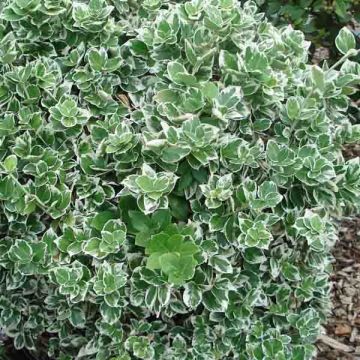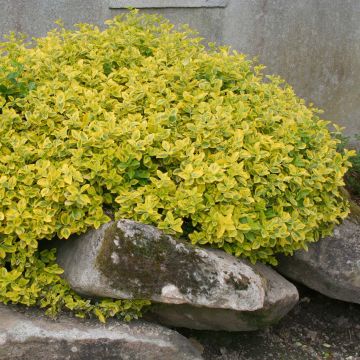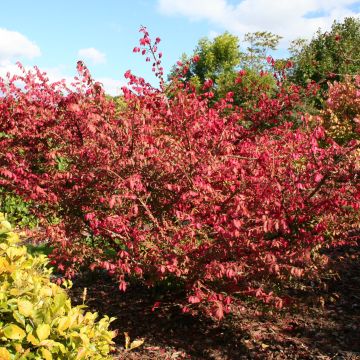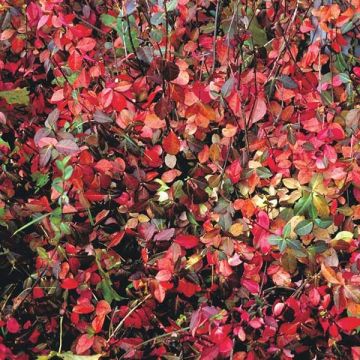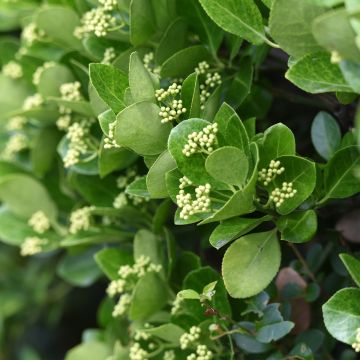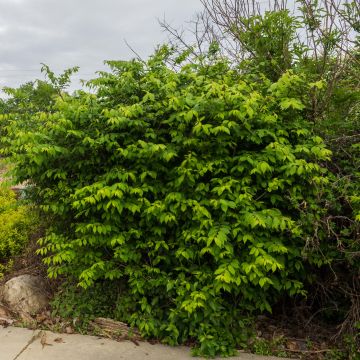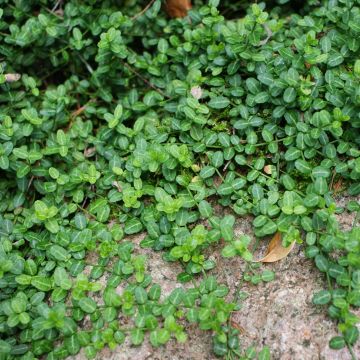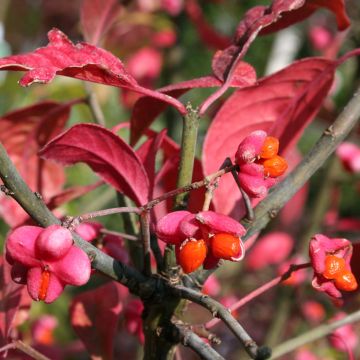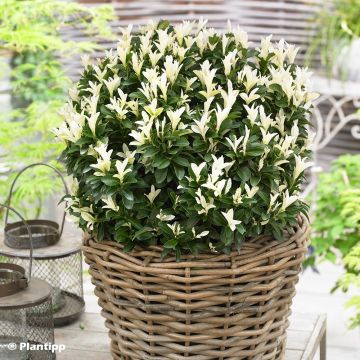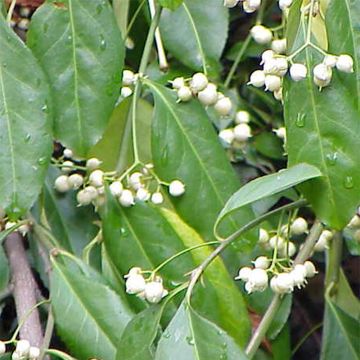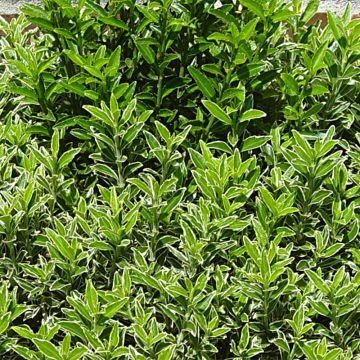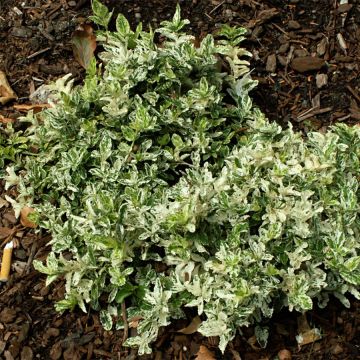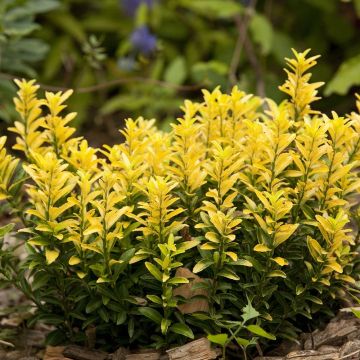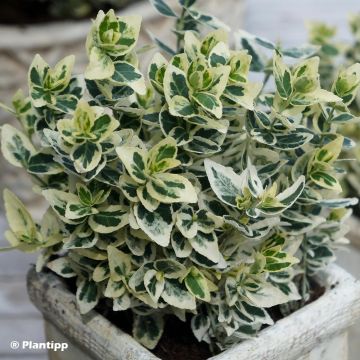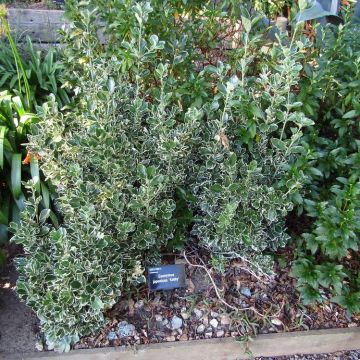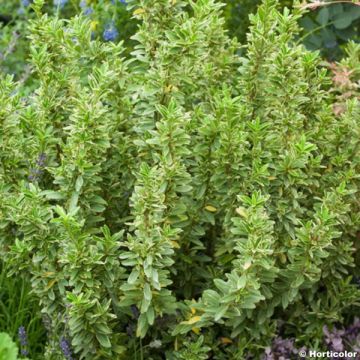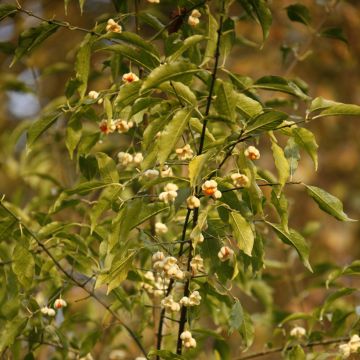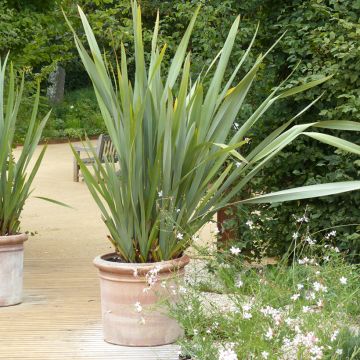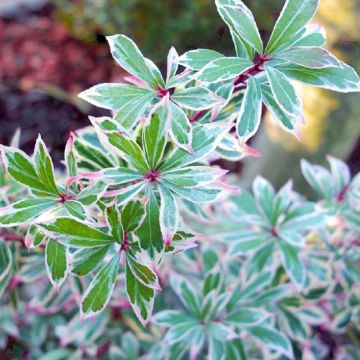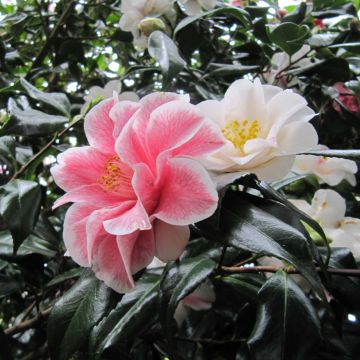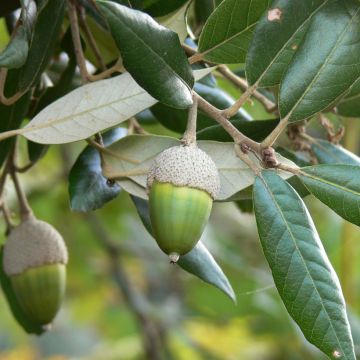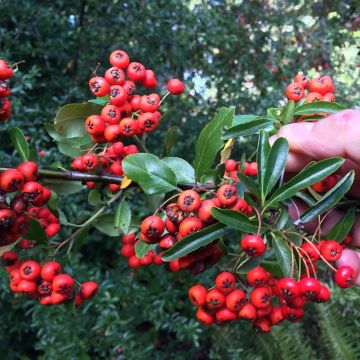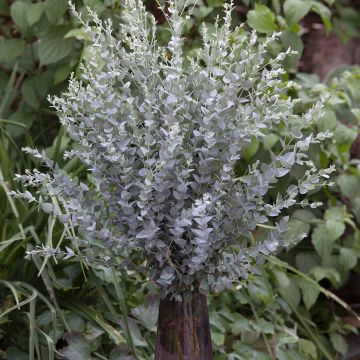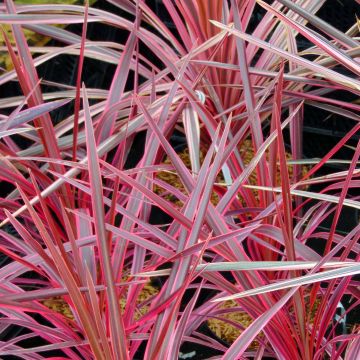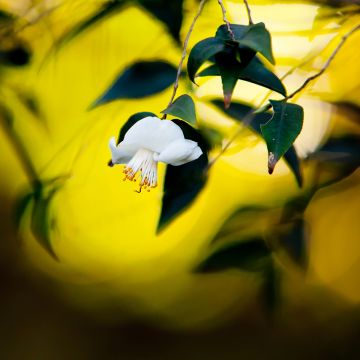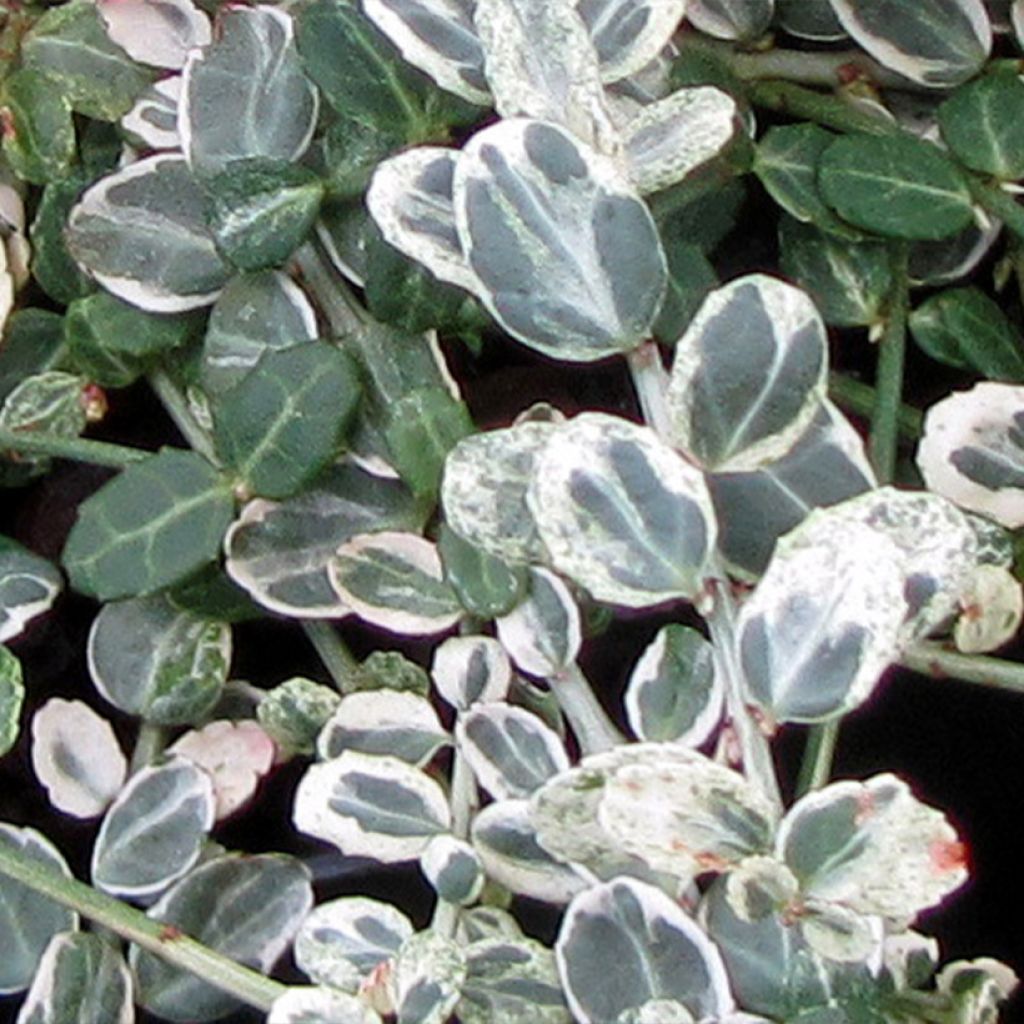

Euonymus fortunei 'Heins Silver' SILVER CARPET - Spindle
Euonymus fortunei 'Heins Silver' SILVER CARPET - Spindle
Euonymus fortunei 'Heins Silver' SILVER CARPET
Euonymus fortunei 'Heins Silver' SILVER CARPET - Spindle
Why not try an alternative variety in stock?
View all →This plant carries a 24 months recovery warranty
More information
We guarantee the quality of our plants for a full growing cycle, and will replace at our expense any plant that fails to recover under normal climatic and planting conditions.
From €5.90 for pickup delivery and €6.90 for home delivery
Express home delivery from €8.90.
Does this plant fit my garden?
Set up your Plantfit profile →
Description
The Euonymus fortunei ‘Silver Carpet’ is a dwarf variety of evergreen and creeping spindle. The bush develops beautiful dark green foliage edged with white, giving a silvery-grey impression, present all year round. In winter, this decorative foliage takes on a pink hue. Always neat in appearance, it can cover the base of trees, slopes, borders, or cascade over the front of flower pots. Its branches, equipped with climbing roots, easily cling to walls, similar to ivy but without becoming invasive. It can therefore scramble as well as climb on a surface. Very tolerant of soil and exposure, it does, however, dislike arid conditions.
Native to Asia and northern China, the Euonymus fortunei is a slow-growing ground cover shrub from the Celastraceae family, perfectly hardy and tolerant of limestone in the soil. The ‘Silver Carpet’ variety is appreciated for its beautiful, bright, vigorous, and dense vegetation, decorative all year round. At maturity, this cultivar does not exceed 35 cm in height and 60 cm in width. It develops flexible branches that have the ability to cling to their support on their own thanks to climbing roots. The evergreen leaves, elliptical and 3 to 4 cm long, are crenate, dark green with a wide cream-white border that does not fade in the sun. At the first signs of cold, they take on a delicate pinkish hue. In spring, insignificant flowering occurs on the new shoots, in the form of small clusters of white-greenish flowers. They give way to decorative pink berries, but they are not edible and are appreciated by birds.
Euonymus fortunei ‘Silver Carpet’ grows in well-drained soil, in non-arid conditions, preferably semi-shaded. In the ground, it can be used as a ground cover for borders, at the front of flower beds, with the purple foliage of heucheras, for example. It can also be placed in pots for balconies and terraces, where the plant cascades beautifully. This spindle, which is entirely toxic to humans, attracts birds. It is possible to let it climb slightly along a wall, fence, or even a tree, up to its height limit.
Tips: In case of drought, water to maintain beautiful foliage.
Report an error about the product description
Plant habit
Flowering
Foliage
Botanical data
Euonymus
fortunei
'Heins Silver' SILVER CARPET
Celastraceae
Euonymus fortunei 'Heins Silver' SILVER CARPET - Spindle
Cultivar or hybrid
Other Euonymus - Spindle tree
Planting and care
The Euonymus fortunei 'Silver Carpet' is preferably planted in spring in any well-drained soil that remains moist, in a sunny or lightly shaded location. It tolerates the presence of limestone in the soil, but dislikes arid conditions. Its hardiness is excellent. Pruning is unnecessary, it is better to pinch the young plants to promote branching and only remove dead or diseased wood. Apply fertiliser twice a year, in early spring and autumn. In case of drought, water to maintain beautiful foliage.
Planting period
Intended location
Care
This item has not been reviewed yet - be the first to leave a review about it.
Evergreen shrubs
Haven't found what you were looking for?
Hardiness is the lowest winter temperature a plant can endure without suffering serious damage or even dying. However, hardiness is affected by location (a sheltered area, such as a patio), protection (winter cover) and soil type (hardiness is improved by well-drained soil).

Photo Sharing Terms & Conditions
In order to encourage gardeners to interact and share their experiences, Promesse de fleurs offers various media enabling content to be uploaded onto its Site - in particular via the ‘Photo sharing’ module.
The User agrees to refrain from:
- Posting any content that is illegal, prejudicial, insulting, racist, inciteful to hatred, revisionist, contrary to public decency, that infringes on privacy or on the privacy rights of third parties, in particular the publicity rights of persons and goods, intellectual property rights, or the right to privacy.
- Submitting content on behalf of a third party;
- Impersonate the identity of a third party and/or publish any personal information about a third party;
In general, the User undertakes to refrain from any unethical behaviour.
All Content (in particular text, comments, files, images, photos, videos, creative works, etc.), which may be subject to property or intellectual property rights, image or other private rights, shall remain the property of the User, subject to the limited rights granted by the terms of the licence granted by Promesse de fleurs as stated below. Users are at liberty to publish or not to publish such Content on the Site, notably via the ‘Photo Sharing’ facility, and accept that this Content shall be made public and freely accessible, notably on the Internet.
Users further acknowledge, undertake to have ,and guarantee that they hold all necessary rights and permissions to publish such material on the Site, in particular with regard to the legislation in force pertaining to any privacy, property, intellectual property, image, or contractual rights, or rights of any other nature. By publishing such Content on the Site, Users acknowledge accepting full liability as publishers of the Content within the meaning of the law, and grant Promesse de fleurs, free of charge, an inclusive, worldwide licence for the said Content for the entire duration of its publication, including all reproduction, representation, up/downloading, displaying, performing, transmission, and storage rights.
Users also grant permission for their name to be linked to the Content and accept that this link may not always be made available.
By engaging in posting material, Users consent to their Content becoming automatically accessible on the Internet, in particular on other sites and/or blogs and/or web pages of the Promesse de fleurs site, including in particular social pages and the Promesse de fleurs catalogue.
Users may secure the removal of entrusted content free of charge by issuing a simple request via our contact form.
The flowering period indicated on our website applies to countries and regions located in USDA zone 8 (France, the United Kingdom, Ireland, the Netherlands, etc.)
It will vary according to where you live:
- In zones 9 to 10 (Italy, Spain, Greece, etc.), flowering will occur about 2 to 4 weeks earlier.
- In zones 6 to 7 (Germany, Poland, Slovenia, and lower mountainous regions), flowering will be delayed by 2 to 3 weeks.
- In zone 5 (Central Europe, Scandinavia), blooming will be delayed by 3 to 5 weeks.
In temperate climates, pruning of spring-flowering shrubs (forsythia, spireas, etc.) should be done just after flowering.
Pruning of summer-flowering shrubs (Indian Lilac, Perovskia, etc.) can be done in winter or spring.
In cold regions as well as with frost-sensitive plants, avoid pruning too early when severe frosts may still occur.
The planting period indicated on our website applies to countries and regions located in USDA zone 8 (France, United Kingdom, Ireland, Netherlands).
It will vary according to where you live:
- In Mediterranean zones (Marseille, Madrid, Milan, etc.), autumn and winter are the best planting periods.
- In continental zones (Strasbourg, Munich, Vienna, etc.), delay planting by 2 to 3 weeks in spring and bring it forward by 2 to 4 weeks in autumn.
- In mountainous regions (the Alps, Pyrenees, Carpathians, etc.), it is best to plant in late spring (May-June) or late summer (August-September).
The harvesting period indicated on our website applies to countries and regions in USDA zone 8 (France, England, Ireland, the Netherlands).
In colder areas (Scandinavia, Poland, Austria...) fruit and vegetable harvests are likely to be delayed by 3-4 weeks.
In warmer areas (Italy, Spain, Greece, etc.), harvesting will probably take place earlier, depending on weather conditions.
The sowing periods indicated on our website apply to countries and regions within USDA Zone 8 (France, UK, Ireland, Netherlands).
In colder areas (Scandinavia, Poland, Austria...), delay any outdoor sowing by 3-4 weeks, or sow under glass.
In warmer climes (Italy, Spain, Greece, etc.), bring outdoor sowing forward by a few weeks.


































